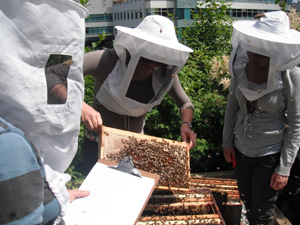
"It's easier than owning a dog," says Alaina Thebault, East Van gardener and coordinator for the Environmental Youth Alliance (EYA). "But more work than a cat."
Thebault's not talking about pet iguanas or even backyard chickens. The next darling of urban agriculture junkies seems to be, well, bees.
"You grow up your whole life being afraid of insects that sting you. I don't recall ever being stung as a child, but it was always something I was afraid of," she says. But beginning this year, Thebault's relationship with the world's leading pollinators took on a whole new dimension.
"I caught my first swarm back in May," she explains. "I was at my parent's house in Chilliwack and my dad found this swarm in the yard." Faced with a buzzing mass of insects orbiting a queen, Thebault had her first up-close-and-personal encounter with a wild bee colony.
"I was like, 'Oh crap.' I had no idea what to do."
Coached by an experienced colleague over the phone, Thebault took charge of the rogue swarm. "She told me to grab a box and put a little bit of sugar in it. She said, 'Just be calm.' I didn’t have anything -- no veil, no gloves -- I just grabbed this branch, and it was surrounded in this big football of bees."
While her parents observed in a mild state of shock, Thebault says in that moment she knew she wanted to look after a hive of her own.
"I was like, 'I'm hooked.' You know, these things are really special."
Not many can claim to have maneuvered thousands of live bees with their bare hands. In fact, most people -- including Thebault's own family -- would gladly call it crazy. But a little bit of learning has pushed Thebault and dozens more young people like her to think about bees in a new light.
"You might not know this, but bees are incredibly docile when they swarm," she explains. "They eat as much honey as they can before they leave the hive. They basically gorge themselves, and so they're incredibly lethargic and harmless."
For the record, Thebault was not stung once during this entire episode. "Once they swarm, they don't have any space to protect so they're not as defensive either," she adds. "So they're very easy to work with."
And that's just the tip of the iceberg, says Thebault. The more she researched the importance of bees in B.C.'s ecosystems and the threat of colony collapse, the more she wanted to bring the tiny creatures into her own backyard.
The big collapse
Over the past five years, beekeepers around the globe have witnessed a massive collapse in honeybee populations. B.C. apiaries have lost an average of 30 per cent of their hives annually -- as high as 90 per cent on parts of Vancouver Island -- mostly because of infectious diseases and pests.
"Bees are dying all over the world," says Allen Garr, a veteran urban beekeeper and promoter of apiaries in Vancouver. Revealing the eggs of parasitic mites underneath his own backyard hive in Kitsilano, Garr says unregulated use of pesticides and antibiotics have caused dangerous resistances. "Attempting to control the mites is compounding the problem," he says.
"Typically, when commercial beekeepers are taking care of thousands of hives, they don't have the time to individually take out every frame and spray it with a small dilution of antibiotics," Thebault says of non-organic treatment methods. "What they'll do is, they'll put it in the feeder so those bees will continually consume and store it."
Widespread misuse of treatment is essentially killing more bees. "The same thing did happen with mites -- beekeepers put in strips of a pesticide and left it for a long time, instead of actually following the directions and removing it before they prepare for the winter."
"Insects will create resistance if you allow them to," she adds. Parasitic mites are now showing resistance to three chemicals used to treat honeybees.*
The fruits of bee labour
As tiny as honeybees may be, their role in British Columbia's economy is enormous.
Not just honey producers, the species pollinates vegetable, nut and fruit crops totaling $2.5 billion in revenue in Canada and around $15 billion in the United States. The same research shows honeybee activity increases the productivity of crops by anywhere from 20 to 90 per cent.
That's why local microbiologists and agriculture specialists are putting their heads together in an attempt to solve the global bee crisis. On Oct. 22 and 23, more than 150 of the province's beekeepers gathered in Richmond for a B.C. Honey Producers Association conference aimed at addressing new ways to breed more resilient bees.
"There are many social behaviours that enable bees to resist disease, such as hygienic behaviour," reads a press release outlining a brand new $5.7 million research project spearheaded by Dr. Leonard Foster at the University of British Columbia. "A cleaner hive tends to suppress the spread of some diseases."
Dr. Foster spoke at the beekeepers' conference in Richmond, alongside experts from Washington, Oregon and California. By looking at genetic traits of more hygienic bees, he hopes to weed out the weak links.
It's an undertaking that could save billions of dollars for the Canadian agriculture industry, but may require big changes to the way bees are currently bred and managed. "We all wish him luck," says Garr. "Because finding genetic markers for resilience is a lot better than laying on chemicals."
Beekeeping: not just for 'geezers'
In stark contrast to big-time commercial apiaries, urban beekeepers often maintain low-impact organic hives near community gardens. With ecology rather than profit in mind, young people in the city have taken beekeeping into their own hands.
"I used to work at a commercial apiary in Surrey," says Sheilagh McKenna, who now teaches a rare hands-on beekeeping course for youth, managed by the EYA. "I was surrounded by older farmer men who looked at me and just said, 'Whoa, she can totally hold her own.'"
"The commercial industry is still dominated by older farmers but I've seen a lot of interest in urban hives," she adds. Taught at the Means of Production garden in Vancouver's Strathcona neighbourhood, McKenna's classes -- attended predominantly by 20-something women -- show students how to avoid pesticides and antibiotics and employ more sustainable practices.
Garr says he, too, has noticed youth interest in beekeeping grow. "It was geezers mostly," he jokes about beekeepers' association meetings in the past. He says attendance at beekeeping functions has jumped to nearly 100 from around 10 in the last couple years. "People are into it now, which was not the case five or eight years ago."
But even though Garr acknowledges the bees are in trouble, he cautions people against jumping into keeping a hive in their home. "I slow people down. I say take a course and assess," he says. "It's an ongoing commitment -- requires a lot of work, space and money."
But for new beekeepers like Thebault, the commitment is a reward in itself.
"We've run into a lot of different challenges -- which is to be expected," she says. "We're learning a lot as we go."
Story updated on Nov. 1 at 1:25 p.m. ![]()
Read more: Environment















Tyee Commenting Guidelines
Comments that violate guidelines risk being deleted, and violations may result in a temporary or permanent user ban. Maintain the spirit of good conversation to stay in the discussion.
*Please note The Tyee is not a forum for spreading misinformation about COVID-19, denying its existence or minimizing its risk to public health.
Do:
Do not: